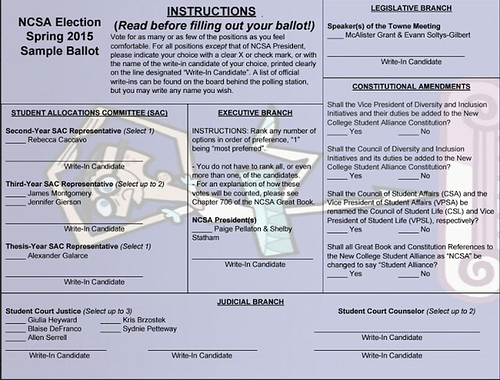
Reading absurd write-in votes, such as “Ham food” and “Florida man,” after finding out the results of the New College Student Alliance (NCSA) election, has become a tradition. However, in the last few years, offensive write-in votes meant to target particular students have led some to question whether there is something amiss with the current voting system.
Following the results of the recent 2014-2015 NCSA election, supervisor of elections, first-year Sabrina Finn, released two documents containing the recorded write-in votes for this election. One of the documents contained every write-in vote that was submitted, and the other contained “redacted” write-in votes – a list of votes excluded due to offensive language.
The decision to publicize the list of abusive write-in votes has received mixed reviews.
“I was a candidate who got a fair number of [abusive write-in votes],” first-year Rebecca “Becca” Caccavo said. “I take my job as SAC [Student Allocations Committee] Representative and CSA [Council of Student Affairs] secretary very seriously. Seeing those write-ins felt not only very petty, but reminiscent of a lot of past instances of cyberbullying in my life.”
The decision to make offensive write-in votes public was not made by the current supervisor of elections, but by Student Court. The Student Court meeting concerning the procedure for classifying and handling abusive write-in votes was held on April 11 in the Old Mail Room.
“Some people didn’t want me to post the abusive write-in votes at all because they didn’t like that people could still see them,” Finn said. “But part of what Student Court decided was that they have to be published. So I had to publish both of those. I got some mixed reviews on that. Some people said they liked it, some people asked me not to publish the abusive ones at all.”
Another factor concerning the issue of write-in votes is that they do serve a purpose besides voicing political dissent.
“Every single [write-in vote] needs to be written down, and this is really important,” thesis student McAlister Grant said. Grant served as Supervisor of Elections from the Fall 2012 semester to this past December. “This is essentially a mechanism for ensuring that the election has been counted correctly. The best comparison I can make is that, back in the ‘80s, the band Van Halen had this stipulation in their contracts that they would have a bowl of M&Ms in their dressing room with all of the brown ones picked out. A lot of people thought that they were primadonnas for this, but the reason they did this was because they had very rigorous, specific safety requirements in their contract for all of their equipment. And they knew that if someone did not follow the M&Ms stipulation correctly, that that called the venue’s adherence to the contract into question completely. So the write-in counts in the same way. If I am writing Battletoads for president, I don’t actually want Battletoads to be president necessarily, but what that means is, if that doesn’t show up on the list of write-in candidates, or the official results, then that calls into question the results of the entire election and whether my ballot was counted at all.”
Despite the necessity of a safeguard to account for the validity of the election’s results, many still wonder what is the motivation behind a write-in vote that is not absurd, but instead meant to target another student.
“I think most people do it as a form of protest, in that they don’t necessarily care who actually gets a position,” Finn said. “Not voting for a position is counted as an abstention, so it doesn’t get counted in anything and nobody sees that. But if you write ‘not this person’ then that goes in the list and everybody who reads that list is going to see it.”
As the current issue stands, abusive write-in votes will continue to be made available to the public, although this does not rule out the possibility of this eventually changing.
“I think it’s going to be, at the very least, very similar to the [current] system,” Finn said about the election for next year. “I’m still brainstorming some things for making sure that the next election is better than this one.”
